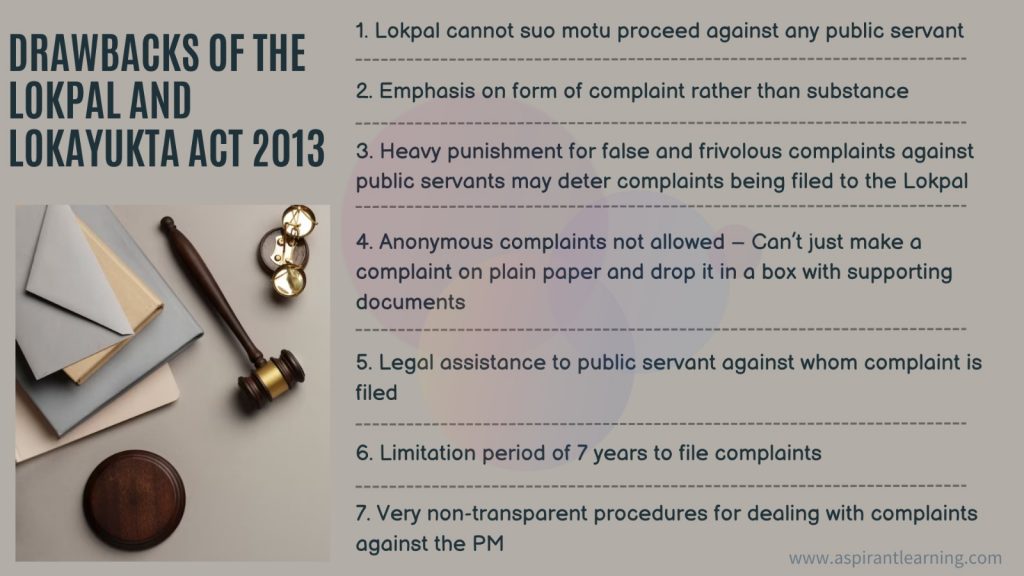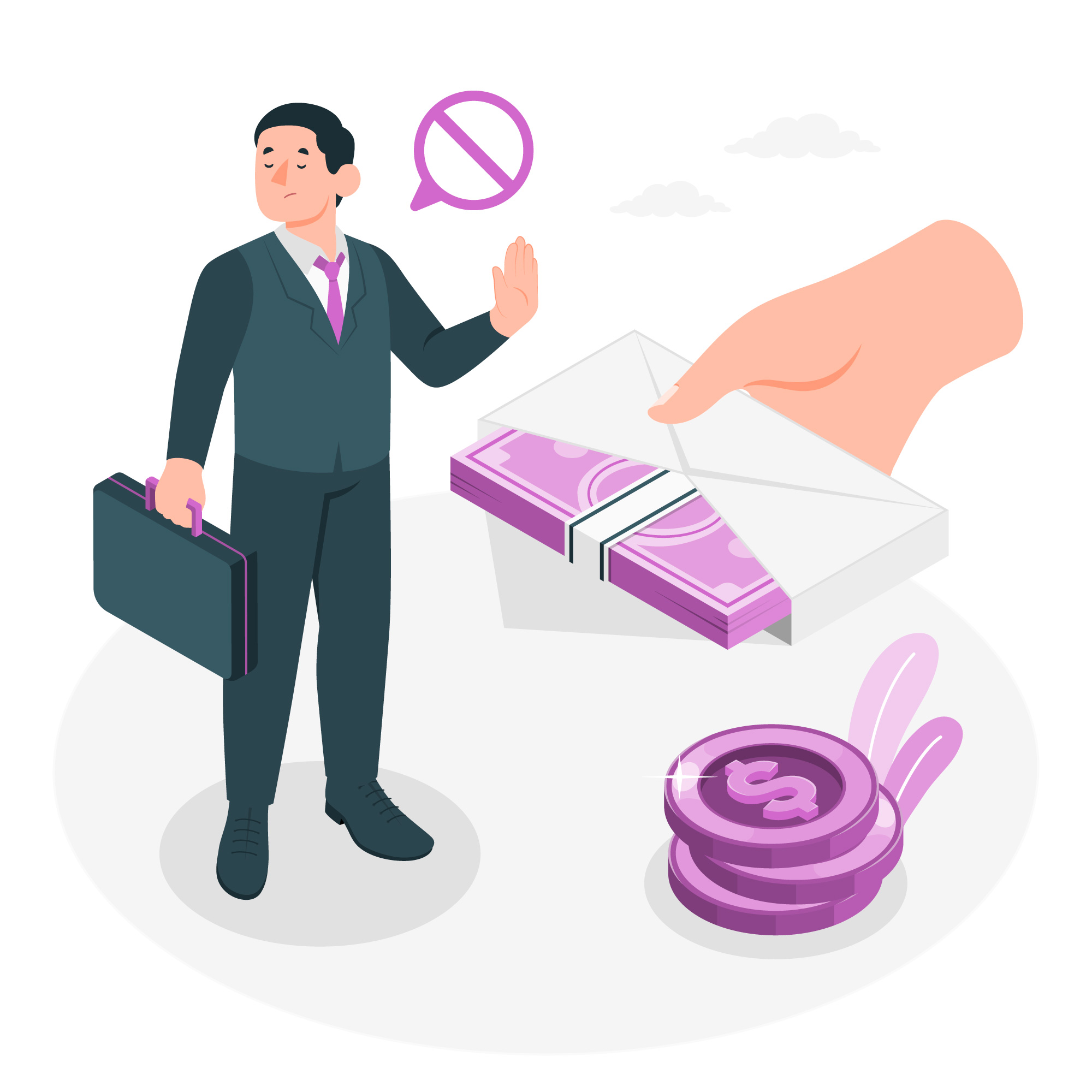News Highlights:
- A Division Bench of the Kerala High Court has held that the Lok Ayukta cannot investigate matters relating to the selection of candidates by political parties for contesting elections.
- The Bench observed that selecting candidates was an internal affair of the political party. The party selected its candidates per its constitution, political principles, policies, and winnability.
Lokpal and Lokayuktas:
- About:
- These institutions are statutory bodies without any constitutional status.
- They perform the function of an “ombudsman” and inquire into allegations of corruption against certain public functionaries and for related matters.
- India’s Lokpal is dedicated to addressing citizens’ complaints and aspirations for clean governance. It must use all of its powers to promote the public interest within its authority and to remove corruption in public life.
- In cases of alleged corruption, the Lokpal provides a mechanism for swift and unbiased investigation and prosecution.
- There are no limitations on who can file a complaint.
- Composition:
- The Lokpal panel must have a chairperson and a maximum of eight members, according to the Act.
- Four of them must be judicial members.
- Eligibility:
- Chairperson of Lokpal: A person must have served as Chief Justice of India, a Supreme Court judge, or a distinguished person with special knowledge and expertise in the areas of anti-corruption policy, public administration, vigilance, finance, law, and management for at least twenty-five years.
- Lokpal Judicial Member: The applicant must have served as a judge on the Supreme Court or as the Chief Justice of the High Court.
- Other Lokpal Members: Eminent persons with at least twenty-five years of specific knowledge and competence in anti-corruption policy, public administration, vigilance, finance, law, and management.
- At least half of the Lokpal members must be from Scheduled Castes, Scheduled Tribes, Other Backward Classes, minorities, and women.
- For the position of Lokayukta: A former Chief Justice of the High Court or a former Supreme Court judge normally serves as the Lokayukta.
- Term of Office:
- The President of India appoints the Chairperson and Members by warrant under his hand and seal, and they serve for a period of five years from the date of their appointment or until they reach the age of 70, whichever is earlier.
Powers and Functions of Lokpal and Lokayukta:
- Power of Lokpal:
- Prime Minister, or a Minister in the Union government, or a Member of Parliament, or all categories of public servants as well as Group A, B, C, and D officers, come under the ambit of Lokpal’s jurisdiction.
- Lokpal has the power to seize the assets, proceeds, receipts, and benefits of any official which are acquired by corrupt means.
- Lokpal is conferred with the power to recommend the transfer or suspension of civil servants connected with corruption charges.
- Lokpal can give directions to avert the destruction of records during the preliminary investigation.
- It has the powers of superintendence over and to give direction to the CBI (Central Bureau of Investigation). It also contains several provisions which are aimed at making the CBI stronger.
- The inquiry Wing of the Lokpal has been authorised with the powers of a civil court in certain cases.
- Lokpal has the authority to grant sanction for the prosecution of public servants in place of the Government or competent authority.
- Functions of Lokpal:
- The Lokpal keeps a watch over all public officials and can take suitable action against them if they do not function in accordance with the law.
- It can act either on the basis of any complaint made by a private person or suo moto (i.e. on his own initiative). The Lokpal can summon or question any public official if there exists a prima facie case against the person, even before an investigation agency (such as CVC, i.e. Central Vigilance Commission or CBI) has begun an inquiry.
- It can also recommend his findings be enforced into action.
- Lokpal to function as the appellate authority for appeals arising out of any other law for the time being in force.
- It has to protect any action taken in good faith by any public servant or other officials. It has to provide adequate protection to those who are being exploited for raising their voice against corruption.
- Power of Lokayukta:
- In states like Himachal Pradesh, Andhra Pradesh, Madhya Pradesh and Gujarat, the chief minister is included within the jurisdiction of Lokayukta while he is exempted from the purview of Lokayukta in the states of Orissa, Bihar, Rajasthan, Uttar Pradesh and Maharashtra.
- Ministers and higher public servants are also included under the ambit of Lokayukta in almost all the states.
- It has the power to raid the houses and offices of corrupt officials at the state level.
- It can call for relevant files and documents from the state government departments.
- It also enjoys the power to inspect and visit government organisations which are being investigated.
- Lokayukta may investigate any action taken by the public servant if it is referred by the state government.
- It has the authority to suggest punishment against the culprit to the administration, but it is up to the state to either accept the suggestions or modify them.
- Functions of Lokayukta:
- Lokayukta is tasked with the speedy redressal of public grievances against politicians and officers in the government service.
- It investigates allegations of corruption, abuse of power, maladministration or lack of integrity against public functionaries at the state level and, once proven, recommends action.
- A consolidated report will be presented by the Lokayukta and Uplokayukta about their functions to the Governor of the state. Hence, they are responsible to the state legislature.
- Its other crucial function is to check the investigation of anti-corruption agencies and authorities.
- It carries out fair and impartial investigations based on facts against the accused person by taking the assistance of a special investigating officer.

Need of Lokpal and Lokayuktas:
- Maladministration:
- It erodes a nation’s foundation like a termite over time and prevents the administration from doing its job. This issue is primarily caused by corruption.
- Independent organisations:
- Most anti-corruption organisations virtually ever function independently. Even the Supreme Court has referred to the CBI as “its master’s voice” and a “caged parrot.”
- Advisory organisations:
- The advice of many of these organisations is rarely acted upon because they are only advisory groups with no real authority.
- The issue of internal accountability and openness also exists. Additionally, there is no distinct and efficient way to hold these institutions accountable.
- Against corruption:
- The creation of independent Lokpal and Lokayukta organisations was a significant development in Indian political history that provided a defence against the corruption problem that would not go away.
Pic Courtesy: Freepik
Content Source: The Hindu



